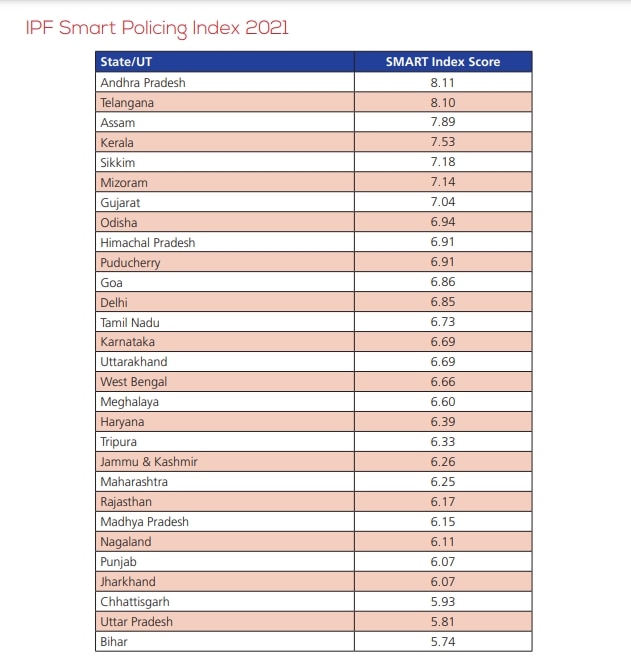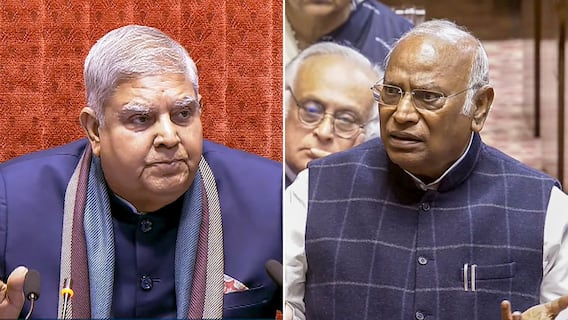AP, Telangana, Assam, Kerala Report Highest Satisfaction With Quality Of Policing, UP & Bihar Lowest: IPF Survey
Andhra Pradesh, Telangana, Kerala, and Assam received the highest trust ratings of citizens, all scoring above 8.

New Delhi: The levels of popular satisfaction with the quality of policing is reported to be highest in Andhra Pradesh, Telangana, Assam, Kerala, Sikkim, Mizoram, and Gujarat, a new survey revealed.
The Indian Police Foundation (IPF) on Thursday released its ‘IPF Citizen Satisfaction Survey on SMART Policing, 2021’.
It aims to gauge public perceptions about the quality of policing in India and the level of public trust in the police.
ALSO READ | India, China Agree On Need To Find Early Resolution To Remaining Issues Along LAC In Eastern Ladakh: MEA
The survey has a total sample size of 1,61,192 wherein 64 per cent of the responses were received online and 36 per cent were gathered through face-to-face, telephonic interviews, and other paper-based data gathering methods. Significantly, Andhra Pradesh and Telangana together accounted for 56.48 per cent of the total number of responses.
The SMART Scores are set on a scale of 1 to 10 and are indicative of the levels of citizen satisfaction, a score of 10 being the highest level of satisfaction.
In the ‘IPF Smart Policing Index 2021’, Andhra Pradesh (8.11), Telangana (8.10), Assam (7.89), Kerala (7.53), and Sikkim (7.18) emerged as the top five states.
On the other hand, the five states that featured at the bottom of the list were Punjab (6.07), Jharkhand (6.07), Chhattisgarh (5.93), Uttar Pradesh (5.81), and Bihar (5.74).
19 states/UTs scored an index value between 6 and 7, while 3 states scored between 5 and 6.

“Almost all states scored slightly higher ratings for professional competency-based elements, while they received lower scores for the values-based ones. Questions on integrity and corruption-free services received the lowest scores across states,” the IPF survey report mentioned.
The Competence-Based Indicators included perception indexes of police sensitivity, strict and good behaviour, accessibility, police responsiveness, helpful and friendly policing, and technology adoption. The Values-Based Indicators involved perception indexes of integrity and corruption-free services, Index of fair, unbiased and lawful policing, and police accountability.
It was further emphasised that “the elephant in the room is the share of the population that have expressed their disenchantment, some holding deeply negative sentiments. While the percentage of those having positive perceptions may be larger, the share of the dissatisfied population that remains unhappy with the state of policing, is sadly, very significant and sizeable”.
ALSO READ | Kulbhushan Jadhav Case: ‘Abide By Letter & Spirit Of ICJ Judgement,’ India Tells Pakistan Over Enacting Law
Index Of Public Trust In Police
In the overall ‘Index of Public Trust in the Police’, it was stated that trust deeply influences the relationship between citizens and the police and plays a very tangible role in police effectiveness and efficiency.
“An absence of trust seriously undermines citizens’ willingness to follow the law and cooperate with the police, which is crucial for effective crime prevention, investigation and intelligence work. Better trust ensures better compliance with the laws of the land and better policing outcomes,” the survey noted.
In this survey, public trust was measured by asking participants to respond to a simple and direct statement: ‘I trust the police in my area’.
The overall Index of Public Trust in the Police produced an average rating of 6.86.
Andhra Pradesh, Telangana, Kerala, and Assam received the highest trust ratings of citizens, all scoring above 8. Six states namely Mizoram, Sikkim, Gujarat, Himachal Pradesh, Haryana, and Goa received scores between 8 and 7.
Eighteen states scored between 7 and 6, while the state of Bihar, the lowest on the accountability scale, received a score of 5.98, the survey report noted.
“An analysis of the participants’ comments indicates that some of the recent events may have shaken the faith of the people in the police, significantly contributing to the negative sentiments expressed,” it mentioned.
Based on citizens’ comments, four possible reasons for negative trust perceptions were identified. These include inadequate respect for the law and human dignity, persistent problems of corruption, an inability on the part of some officers to stand up for the law or stand by their decisions, and a deficit in moral authority to resist extraneous interferences and pressures.
“Many survey participants felt that there should be better quality of communications between the police and the public and that police should be more willing to listen, consult, explain and engage with citizens for improving trust,” the survey noted.
It was stressed also that “petty corruption, venality and sometimes open extortion of money by some police persons, has been the largest single subject of adverse comments. Perceptions of corruption have resulted in tremendous impairment of police image and trust”.
The IPF survey report highlighted that almost all states in India received lower ratings for values-based indicators of fairness and unbiased policing as well as integrity and corruption-free services.
“While copious efforts are being made to improve professional skills and technology adoption, there is inadequate focus on the values-based attributes and principles that should guide the police in their actions,” it observed.
Trending News
Top Headlines






































